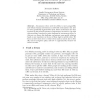171 search results - page 29 / 35 » Logical omniscience and common knowledge: WHAT do we know an... |
AIM
2006
13 years 7 months ago
2006
maintain awareness of its environment for a long period of time. Additionally, knowledge-intensive agents must be engineered such that their knowledge can be easily updated as envi...
DRUMS
1998
Springer
13 years 11 months ago
1998
Springer
Autonomous robots need the ability to move purposefully and without human intervention in real-world environments that have not been speci cally engineered for them. These environm...
CADE
2005
Springer
14 years 7 months ago
2005
Springer
We present a fully proof-producing implementation of a quantifier elimination procedure for real closed fields. To our knowledge, this is the first generally useful proof-producing...
HICSS
2003
IEEE
14 years 25 days ago
2003
IEEE
We adopt the decision-theoretic principle of expected utility maximization as a paradigm for designing autonomous rational agents operating in multi-agent environments. We use the...
EUSFLAT
2009
13 years 5 months ago
2009
One of the new trends in genetic fuzzy systems (GFS) is the use of evolutionary multiobjective optimization (EMO) algorithms. This is because EMO algorithms can easily handle two c...

